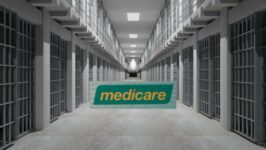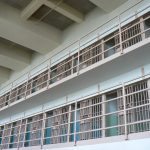Inmates Continue to Be Denied Medicare: An Interview With NSPTRP’s Connie Georgatos

Australian state and territory governments love to invest in building further prison capacity, but they tend to draw the line at funding adequate on-site healthcare for prisoners.
This means that those being denied their liberty at order of the courts, are also withheld medical treatment.
Australian correctional centres are a state and territory matter. However, Medicare is a federal concern. And up until now, policymakers in Canberra haven’t been able to find it within themselves to bridge this gap.
So, while those on the outside are able to access medical care at low cost or none at all, those inside are often left to suffer in pain for prolonged periods.
Some in the community might simply shrug their shoulders, thinking that as these people have done the crime, they should do the time. The issue is, though, doing the time doesn’t mean the shredding of all rights and dignity.
Another point those still shrugging might want to consider – as well as politicians – is that having people confined in prison together with unattended medical needs spreads disease and when these individuals are released this ill health this affects the wellbeing of the entire community.
A simple amendment
The Health Insurance Act 1973 (Cth) governs the national Medicare regime, which includes the Pharmaceutical Benefits Scheme (PBS).
Section 19(2) of the Act stipulates that when health services are being provided by, on behalf of, or under arrangement with, any government entity – whether that’s federal, state or local – Medicare isn’t available to cover the costs.
This law assumes that prisoners are excluded from Medicare because states are providing equivalent services.
However, the grim reality is that our nation’s correctional facilities aren’t servicing the healthcare needs of inmates in the same way that people’s health is attended to in the community.
And Australian prisons aren’t filled with murderers and child rapists. They’re often being used to warehouse those from lower socioeconomic circumstances, people with mental and cognitive disabilities, as well as large numbers of First Nations peoples being held over minor offences.
So, not only are these people disadvantaged when living in the community, but on entering prison, their health issues are left to worsen.
Perspective from inside
Calls to extend Medicare to prisoners is not new. But Connie Georgatos has just reignited the campaign with an online petition, outlining that the 42,000-odd inmates currently being denied access to adequate healthcare nationwide includes around 1,000 children annually.
Georgatos is the project manager of the WA-based National Suicide Prevention and Trauma Recovery Project (NSPTRP). And her work takes her into some of that state’s correctional facilities, where she’s witnessed first hand the deprivations this lack of healthcare is leading to.
Sydney Criminal Lawyers spoke to Connie Georgatos about the impact that arrangement is having upon those currently detained, the type of care that is on hand for prisoners and the need for the wider public to put this issue on the agenda of state and federal governments.

Firstly, as you point out, the 42,000 prisoners in this country are denied health rights, such as Medicare and access to the Pharmaceutical Benefits Scheme (PBS). This not only impacts adult inmates but also around 1,000 children annually.
Connie, what does this mean in terms of how the health needs of Australians are catered for if they’re sent to prison? How are prisoners’ health needs met?
Currently, when an individual is incarcerated, it’s incredibly difficult to get access to adequate healthcare.
One individual who I met inside prison springs to mind, as he had bowel cancer and it took a year to diagnose, because he wasn’t able to get proper doctors to look at him for such a long period.
It’s very hard to get good doctors. There’s an absolute lack. And the same goes for incarcerated children as well.
So, are prisoners simply denied proper access to adequate healthcare in general, or if, say, someone has the finances to access a doctor are they able to?
They’re just denied in general. It is not about the money per se. There’s a lack of staffing.
So, to meet the criteria to see a proper doctor you have to be in really dire circumstances to actually be taken out of the prison, as there’s no in-house GPs.
There are nurses, which can be seen occasionally. But they deal with very general things, and they can only ever provide medication like Nurofen.
You’re not going to get proper healthcare if you are incarcerated unless it’s almost to the point of being lethal.
Your work as project manager for the National Suicide Prevention and Trauma Recovery Project takes you into correctional facilities, so you’ve seen the impacts of what the denial of Medicare is having firsthand.
What have you witnessed?
One time, I visited the medical unit to see if there was anyone in there who needed assistance, and I met this gentleman who was having severe nerve pain running through his head.
He’d been in the medical unit for two weeks in absolute agony, begging for treatment. All they’d done for him was prescribe Panadol and Nurofen – just general medicine.
It took me and my co-workers going down there, discovering him, then lobbying at meetings and bringing it up with the highest staff before he could access treatment. It took all of that for him to finally receive healthcare.
But if that hadn’t happened, we don’t know just how long he would have been sitting down there, as there were no plans prior to that intervention for him being taken to a facility.
What are some of the broader implications of denying prisoners proper access to healthcare?
It contributes to ongoing discrimination towards those who are incarcerated, which does happen to be those of a lower socioeconomic standpoint and those who come from disadvantage.
So, for them to then go into a system where people are at a higher risk of contracting various types of diseases and not receiving healthcare further marginalises them.
These people also don’t receive any assistance for things such as getting their ID, employment or housing.
So, all this impacts upon the person on release, marginalising them further, while they really need support and not to be ostracised.
The campaign to extend Medicare to incarcerated people is not new. It’s been going on for about two decades, with the support of peak bodies and academics. Yet these calls go unheeded.
In your opinion, why haven’t the authorities stepped up to make this reform?
The main reason there hasn’t been enough action on this is due to the cost burden associated with providing Medicare to incarcerated individuals. That’s the cost associated with transportation and hiring in-house GPs.
There is also a huge disconnect with those making the decisions not understanding how horrific it is to be sitting in a cell and having cancer for a year, while no one is prepared to do anything about it.
There’s also a prejudice surrounding those in prison. The common societal belief is that if you are in prison, you are in there for a reason, and when you go there you lose basic rights.
So, this is operating as an extra punishment for those who have been sentenced to prison.
Yes, exactly.
If Medicare, the PBS, and the NDIS were extended to prisoners what sort of changes would this bring about?
This would bring a lot of dignity back to people who it has been stripped from. It would show the government is willing to make change and recognises that there needs to be.
It would help end the cycle of repetitious reoffending. It would restore a lot of faith for those who have been incarcerated, and their family members.
It would be very impactful especially for the Indigenous community, as they do represent a large number of prisoners.
So, to make that step would show empathy from the government.
Your work with the NSPTRP takes you into prisons. What sort of work do you carry out within them?
I’m with a team of three. There is me and two psychosocial officers. We have about 300 cases within the prisons and provide a lot of psychosocial and suicide counselling.
We specifically go down to detention units and medical blocks to speak with at-risk Indigenous prisoners who have been demonstrating suicidal thoughts, and, on top of that, we assist people with housing, education and training for employment.
We have got two guys starting university. We help with general day-to-day things like Centrelink payments and housing. These are things that are very rudimentary but often go unaddressed.
When individuals are released, we also do community work. So, we will visit them and take them to training for employment and interviews. We also work with families on the outside.
There is a lot of follow through, we don’t just refer. We make sure they’re supported as much as can be, because complex cases require a lot of support.
And lastly, Connie, this is an issue that a lot of the community are unaware of. In your opinion, what has to change in order to bring about the expansion of Medicare into the prison system?
At an individual level, it’s good to be addressing this and talking about this issue. I started a Change.org petition to get people aware of the issue, and not many people knew about it unless they were working within the sector.
It was quite a shock for people.
We need to write about it and talk about it to bring about that change at the higher level. And we need to get the government to provide medical treatment, regardless of any potential costings.







